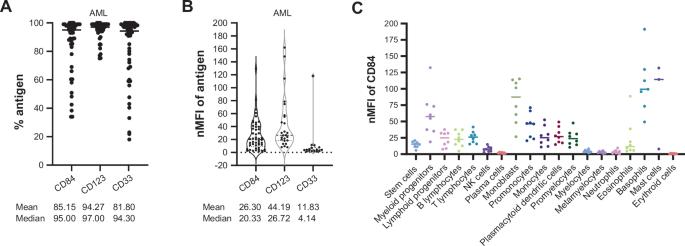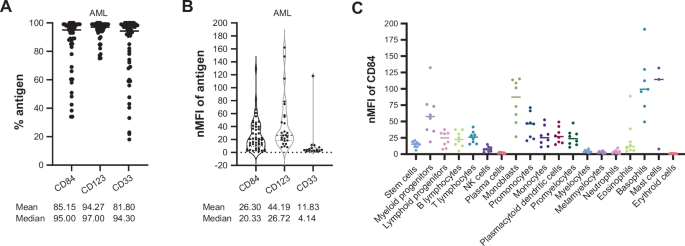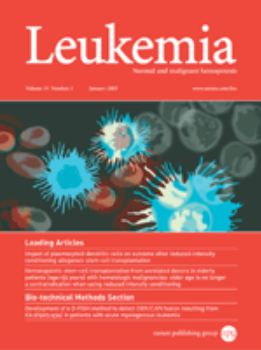靶向CD84的新型嵌合抗原受体t细胞疗法治疗急性髓细胞和t淋巴细胞白血病
IF 13.4
1区 医学
Q1 HEMATOLOGY
引用次数: 0
摘要
尽管嵌合抗原受体(CAR) t细胞疗法在治疗b细胞恶性肿瘤和多发性骨髓瘤方面取得了显著的临床成功,但在其他适应症中尚未取得类似的结果。对于复发或难治性(R/R)急性髓性白血病(AML)或t细胞急性淋巴细胞白血病(T-ALL)患者,治疗选择有限,但cart细胞疗法提供了巨大的潜力来解决这一未满足的需求。在这里,我们介绍了一种针对CD84(一种新型抗原)的一流cart细胞疗法,用于治疗R/R AML和T-ALL。CD84在白血病母细胞中高表达,在造血干细胞(HSPC)中表达有限,在健康人体组织中基本不存在。我们的第二代靶向CD84 (CART84)的cart在体外和体内对患者源性异种移植(PDX)模型的AML和T-ALL细胞都显示出强大的细胞毒性。此外,在体外和体内人源化小鼠模型中,CART84消除了原发性白血病母细胞,同时对CD34+ HSPC表现出较低的细胞毒性,表明其骨髓毒性风险较低。这些结果支持CD84作为AML和T- all的有希望的靶点,并为我们即将进行的首个人体I/II期临床试验提供基础,该试验使用CD84靶向CAR - T细胞治疗R/R AML和T- all患者(EudraCT 2024-519966-31-00)。本文章由计算机程序翻译,如有差异,请以英文原文为准。


A novel chimeric antigen receptor T-cell therapy targeting CD84 for the treatment of acute myeloid and T-cell lymphoblastic leukemias
Despite the remarkable clinical successes of chimeric antigen receptor (CAR) T-cell therapies in treating B-cell malignancies and multiple myeloma, similar outcomes have not been achieved in other indications. For patients with relapsed or refractory (R/R) acute myeloid leukemia (AML) or T-cell acute lymphoblastic leukemia (T-ALL), treatment options are limited, yet CART-cell therapies offer significant potential to address this unmet need. Here, we introduce a first-in-class CART-cell therapy targeting CD84, a novel antigen, for the treatment of R/R AML and T-ALL. CD84 is highly expressed on leukemic blasts, with limited expression on hematopoietic stem progenitor cells (HSPC), and is largely absent in healthy human tissues. Our second-generation CARTs targeting CD84 (CART84) demonstrate potent cytotoxicity against AML and T-ALL cells both in vitro and in vivo in patient-derived xenograft (PDX) models. Furthermore, CART84 eliminated primary leukemic blasts while exhibiting low cytotoxicity against CD34+ HSPC in vitro and in humanized mouse models in vivo, suggesting a low risk of myelotoxicity. These results support CD84 as a promising target for AML and T-ALL and provide the foundation for our upcoming first-in-human phase I/II clinical trial using CD84-directed CAR T cell therapy for patients with R/R AML and T-ALL (EudraCT 2024-519966-31-00).
求助全文
通过发布文献求助,成功后即可免费获取论文全文。
去求助
来源期刊

Leukemia
医学-血液学
CiteScore
18.10
自引率
3.50%
发文量
270
审稿时长
3-6 weeks
期刊介绍:
Title: Leukemia
Journal Overview:
Publishes high-quality, peer-reviewed research
Covers all aspects of research and treatment of leukemia and allied diseases
Includes studies of normal hemopoiesis due to comparative relevance
Topics of Interest:
Oncogenes
Growth factors
Stem cells
Leukemia genomics
Cell cycle
Signal transduction
Molecular targets for therapy
And more
Content Types:
Original research articles
Reviews
Letters
Correspondence
Comments elaborating on significant advances and covering topical issues
 求助内容:
求助内容: 应助结果提醒方式:
应助结果提醒方式:


